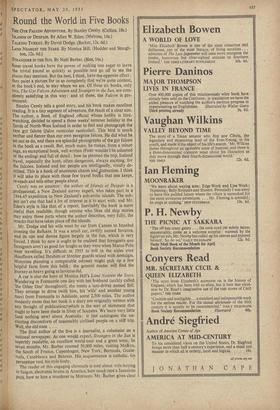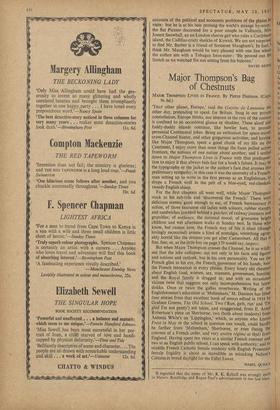TALKING TURKEY. By David Dodge. (Barker, 12s. 6d.) STRANGERS IN
THE SUN. By Noel Barber. (Bles, 16s.) SOME travel books have the power of making one eager to leave the trivial round as quickly as possible and go off to see the places they mention. But the best, I think, have the opposite effect : they paint a picture for us so completely that we're quite content, at the book's end, to stay where we are. Of these six books, only two, The Gyr Falcon Adventure and Strangers in the Sun, are com- pletely satisfying in this way : and of these, the Falcon is pre- eminent.
Stanley Cerely tells a good story, and his book makes excellent reading. It is a tiny segment of adventure, the result of a clear aim. The author, a Bank of England official whose hobby is bird- watching, decided to spend a three weeks' summer holiday in the fjords of North-West Iceland in order to find and photograph the rare gyr falcon (falco rusticolus rusticolus). This bird is much swifter and fiercer than our own peregrine falcon. He did what he set out to do, and there are splendid photographs of the gyr falcon in the book as a result. But, much more, he makes, from a minor saga, an exceptional book, well written (Pater wouldn't be ashamed of the ending) and full of detail : how he planned the trip, Iceland travel, especially the hunt, often dangerous, always exciting, for the falcons. Iceland and her people arc intelligently, vividly de- cribed. This is a book of enormous charm and distinction. I think it will take its place with those few travel books that one keeps, re-reads and tells other people about. Cerely was an amateur: the author of Islands of Despair is a Professional, a New Zealand survey expert, who takes part in a 1944-45 expedition to New Zealand's sub-arctic islands. The sub- ject isn't one that had a lot of interest in it to start with; and Mr. Eden's style is like that of a report. Inevitably the book is more useful than readable, though anyone who likes old ship stories may enjoy those parts where the author describes, very fully, the wrecks that have taken place off the islands.
Mr. Dodge and his wife went by car from Cannes to Istanbul crossing the Balkans. It was a small car, swiftly named Invictus, and its ups and downs figure largely in the fun, which is very forced. I think by now it ought to he realised that foreigners qua foreigners aren't as good for laughs as they were when Marco Polo went travelling. It's difficult in 1955 to roll in the aisles over chauffeurs called Ibrahim or frontier guards seized with nostalgia. Motorists planning a comparable odyssey might pick up a few helpful facts from this bdbk : the general reader will find the journey as heavy going as Invictus did.
A car is also the hero of Monica Hill's Land Nearest the Stars. Wandering in Fremantle one day with her husband (archly called 'the Other One' throughout), she meets a taxi-driver named Bill. They arrange to drive (with him, his 'wife' and another young Man) from Fremantle to Adelaide, some 2,500 miles. The author modestly slates that her book is a diary not originally written with any thought of publication, which is the sort of statement that ought to have been made in front of Socrates. We learn very little (and nothing new) about Australia : it just catalogues the un- exciting discomforts of reasonably civilised people on a stiff trip. Well, she did state . . .
The final author of the five is a journalist, a columnist on a national newspaper. As one would expect, Strangers in the Sun is
superbly readable, an excellent world-tour and a great tonic. In seven months, Mr, Barber roamed 50,000 miles, visiting Malltya, the South of France, Copenhagen, New York, Bermuda, Guate- mala, Casablanca and Bahrein. His acquaintance is catholic, his Perception vast, his style lively.
The reader of this engaging chronicle is told about wife-buying in Saigon, electronic brains in America, how much rent a Jamaican pays, how to hire a murderer in Morocco. Mr. barber gives clear accounts of the political and economic problems of the places be visits: but he is at his best probing the world's strange by-ways: the flat Picasso decorated for a poor couple in Vallauris, Mrs. Jossett Snowball, an ex-London chorus girl who rules a Caribbean island, the Cadillac-crazy sheikhs of Kuwait. We are not surprised to find Mr. Barber is a friend of Somerset Maugham's. In fact. I think Mr. Maugham would be very pleased with one line where the author sits with a Tobagan lotus-eater : 'He poured out the Scotch as we watched the sun setting from his balcony.'











































 Previous page
Previous page